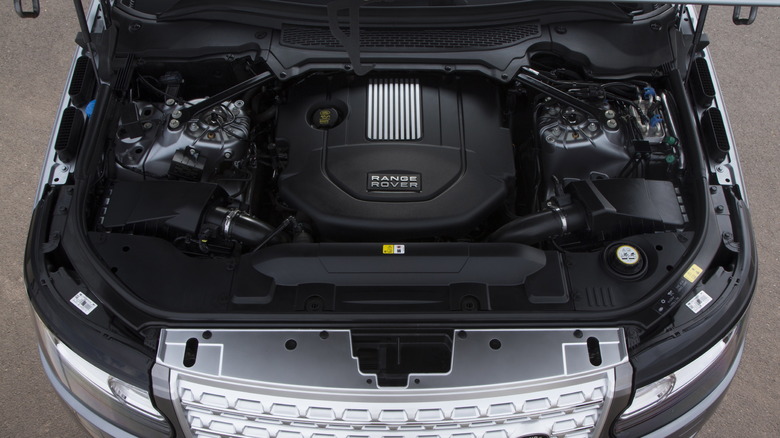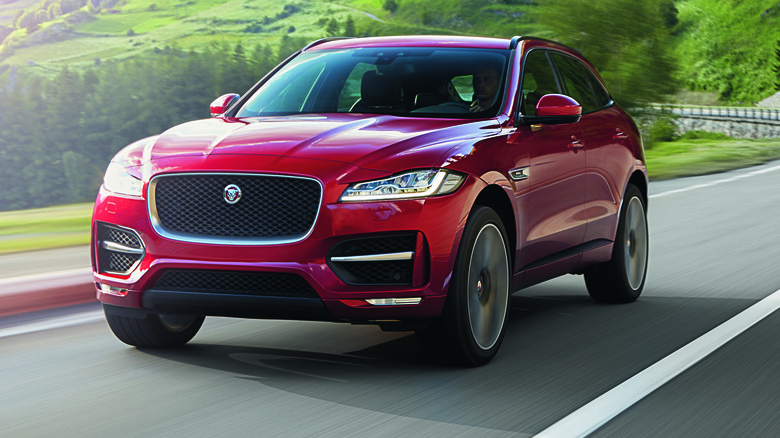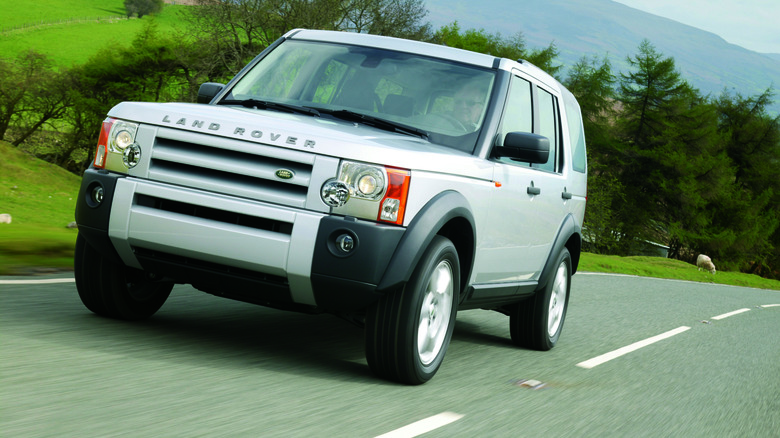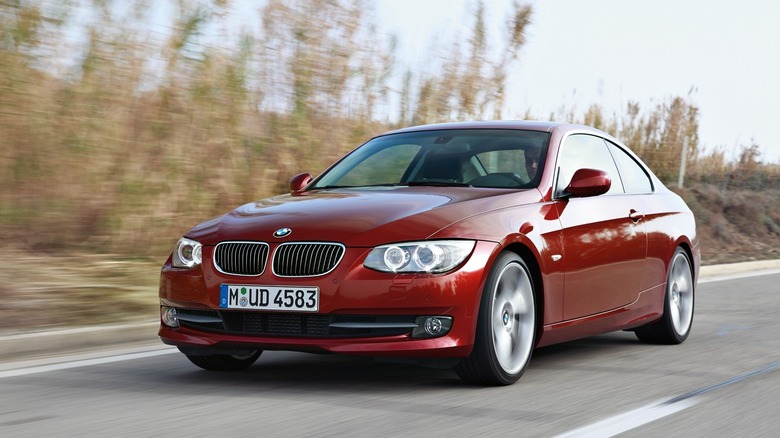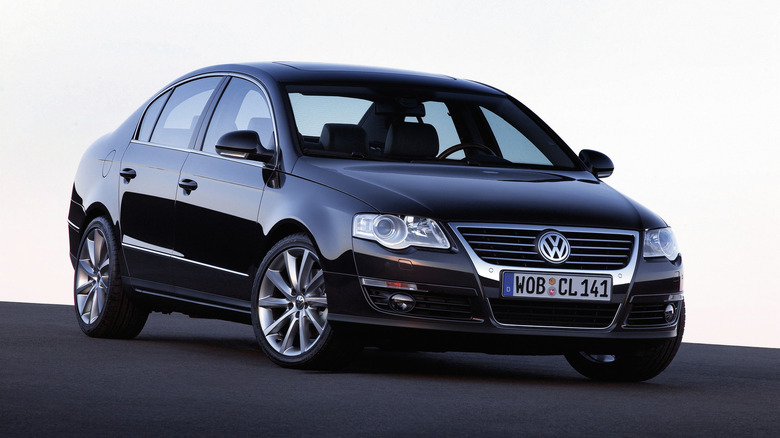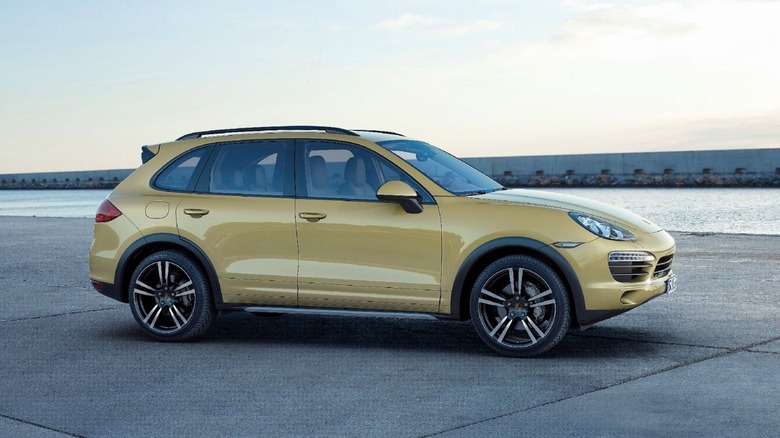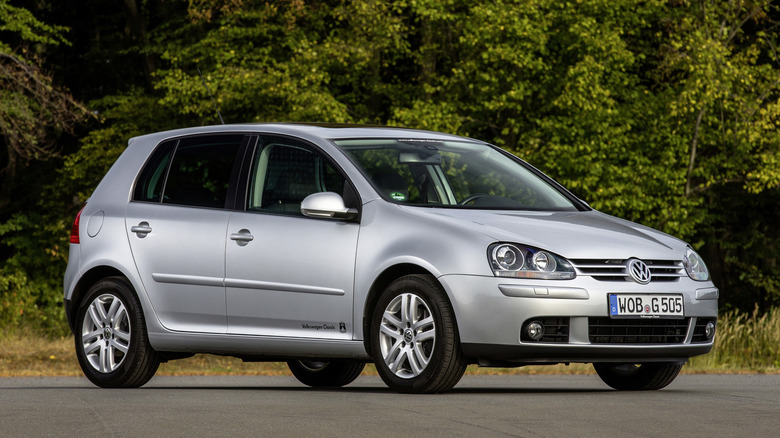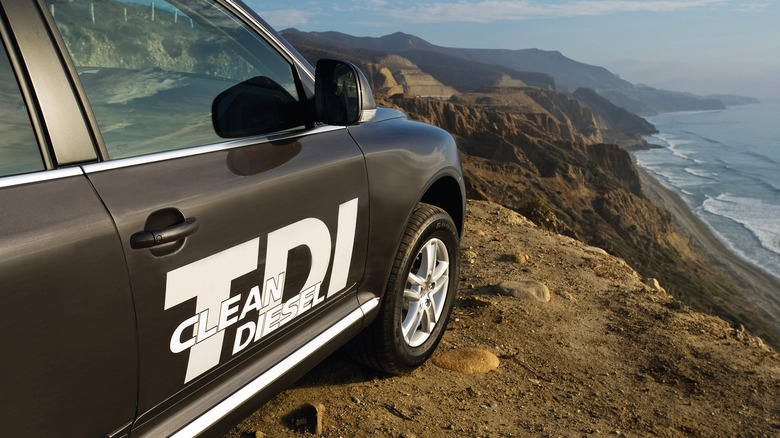The 6 Worst Diesel Engines Ever Made By European Automakers
Passenger cars with diesel engines never really took off in North America. Low gas prices certainly played a big role in that reality, but VW's infamous dieselgate scandal was the final nail in the coffin. In Europe, though, diesel-powered family cars once ruled the automotive landscape. At the turn of the century, diesel cars even outsold gas cars in Europe. Heck, in some countries, like Belgium and France, diesel-powered vehicles constituted nearly 80% of the new car market.
The high demand for diesel cars forced automakers to push new diesel engines at an unprecedented rate. The competition was stiffer than ever, and new technologies, like common rail and Pumpe Düse injections systems, meant that each automaker needed completely new engines to compete. Engines, as in plural? Oh, yes, everything from tiny city cars to large SUVs had a diesel engine as an option.
So, naturally, in the race to be the first on the market with a more advanced diesel engine, automakers accelerated development quite significantly. As a result, some diesel engines made by European automakers were quite poor in terms of reliability and durability. In my career as an automotive journalist in Europe, I had a lot of first-hand driving experience, but also talked to many technicians about their experiences regarding reliability. In this piece, I'll give you some of the worst diesel engines ever produced by European automakers.
Jaguar Land Rover 2.0 Ingenium (2015 to Present)
Land Rover and Jaguar are notorious for building unreliable and expensive-to-repair vehicles, so it would come as no surprise that one of their engines is included on this list. The AJ200D 2.0-liter Ingenium is a four-cylinder diesel with common rail injection that is available in turbocharged or twin-turbocharged form. Depending on the state of tune, power ranges from 150 hp to 240 hp, which is actually pretty high for such a small diesel engine. As a result, a Jaguar F-Pace equipped with that unit reached 62 mph in 7.2 seconds while returning 41 mpg.
Unfortunately, there is a high probability the savings you'll see at the pump could be spent on repairs. This is particularly true for earlier versions of the AJ200D, which were notorious for timing chain failures. This might come as a surprise to some, as timing chains should be more durable than belts. Still, on the Ingenium, this happened mainly due to the tensioner failing, causing the timing chain to stretch. Prematurely worn balancer bearings were quite common, too.
Another common issue is oil dilution because it mixes with the diesel fuel. This can lead to premature wear of the internal components, or oil overfilling the engine. Like most modern diesel engines, the AJ200D also has problems with a clogged DPF filter and EGR valve, but those are easy to solve at least. JLR (Jaguar Land Rover) didn't help matters by recommending an oil change interval of 21,000 miles or two years, whichever comes first. From experience, changing the oil more frequently could significantly improve the reliability of the AJ200D engine.
Jaguar Land Rover 2.7 & 3.0 TDV6 (2004 to 2020)
JLR's TDV6 diesel engines were designed in collaboration with Ford and Peugeot-Citroen. Earlier versions had a 2.7-liter capacity, which rose to 3.0 liters in 2009. Both versions were available in turbocharged or twin-turbocharged form, with up to 306 hp and massive 516 lb-ft of torque. Each engine of this family was equipped with Common Rail diesel injection.
The issue with these engines, particularly earlier examples, is broken crankshaft and bearing failures. It is a serious problem that necessitates a new half-engine, or a full-engine repair. Interestingly, the crankshaft issue mostly happened on models with the six-speed automatic ZF transmission, perhaps due to harmonic vibration.
Still, TDV6 engines also had plastic thermostat housings, which could break and lead to overheating. Moreover, oil leaks are frequent in these motors, particularly from the crankshaft oil seals. Like in most modern turbodiesel engines, clogged EGRs are common, too. To make things worse, units equipped with a Siemens Common Rail system with piezo injectors could starve the cylinder of fuel. This could lead to higher combustion temperatures and cause misfires or even melted pistons if not rectified on time.
For what is worth, JLR admitted that these engines had problems with broken cranks and failed bearings and issued a service bulletin in 2014. Thus, newer versions of this engine should be more reliable, or at least they shouldn't have the same issue. For what it's worth, Land Rover has also built some very reliable engines across the decades, too.
BMW N47 (2007 to 2011)
BMW's N47 turbodiesel engines were very advanced for their time, providing class-leading performance and fuel economy. Two four-cylinder versions were available, a 1.6-liter and a 2.0-liter. In the facelifted fifth-gen BMW 320d the N47 produced 177 hp, while returning an astonishing 49 mpg combined.
Unfortunately, the N47 is notorious for the timing chain issue that plagued many units. The timing chain could get loose due to damaged crankshaft sprockets, which at first would affect the performance of the engine. However, if the owner didn't react on time, the problem could lead to the engine not starting. If the timing chain broke, it could wreak havoc on the internal parts and necessitate an engine rebuild or an entirely new engine.
To make things worse, some N47 units didn't rattle before they snapped, so the owner wouldn't have known there was an issue. Even if the owner reacted on time, replacing the timing chain is an expensive engine-out job. The N47 had other issues as well, like improper turbocharger regulation, which could lead to a blown-out engine.
In 2021, BMW also recalled 800,000 diesel engines of the N47, N57, and B47 families due to a fire hazard. According to the company, a coolant leak from the EGR coolers could mix with the soot from the engine, potentially leading to a fire. Fortunately, in this case, BMW solved the issue via a recall. The Bavarian automaker also upgraded the timing chain, and from 2011 on, it was a non-issue. Thankfully, this has meant that newer BMWs have been very reliable.
Volkswagen 2.0 TDI Pumpe Düse (2004 to 2009)
Every modern diesel engine uses a common rail direct injection. It consists of one high-pressure pump and a fuel rail that equalizes the pressure entering each injector. However, VW Group was developing its in-house high-pressure diesel injection technology at the turn of the century — which it called Pumpe Düse, where each injector was also equipped with a high-pressure pump. Yup, that's four high-pressure diesel pumps waiting to fail on the 2.0-liter four-cylinder TDI engine!
Despite their complexity, Pumpe Düse had some advantages. For instance, due to the higher injection pressure, this technology allowed higher performance and better fuel economy. The most popular 2.0 TDI unit, for example, was available in 138 hp and 168 hp tunes, with the more powerful one achieving an outstanding 39 mpg combined in the 2005 Passat. Not bad for a sedan with a top speed of 139 mph! Moreover, the 1.9 TDI is one of the most reliable diesel engines ever built, yet it was available with the same injectors in later versions.
Still, apart from the complex injectors — which were very costly to replace — the 2.0 TDI Pumpe Düse had other issues. Since the camshaft drove each pump-injector, it was subjected to a higher stress than common rail diesel engines. Also, this necessitated more frequent timing belt changes. If that wasn't enough, the 2.0 TDI also suffered from oil pump failures, which could lead to costly turbocharger and engine repairs. Unsurprisingly, VW abandoned the technology and slowly moved to common rail diesel engines.
Volkswagen/Audi 3.0 TDI V6 (2004 to 2013)
VW Group was no stranger to the common rail technology even when the 2.0 TDI Pumpe Düse was still on the market. One of the early such engines was the 3.0 TDI V6, introduced in 2004. Designed to power VW Group's more luxurious vehicles, this six-cylinder was a technological tour-de-force, producing up to 245 hp and 406 lb-ft of torque, while being super economical. In fact, in the second-gen 2011 Porsche Cayenne, the 3.0 TDI V6 had a combined fuel economy of 32 mpg.
Unfortunately, the engine was notorious for breaking down early, often at around the 100,000-mile mark. It was plagued by all sorts of issues, each very costly to repair. The timing chain tensioner failed frequently, which could prematurely wear the timing chain and lead to expensive engine repairs. The piezoelectric injectors also failed frequently and were unable to supply the cylinder with too much or not enough diesel fuel, leading to increased combustion temperatures. Thus, broken pistons are very common in the 3.0 TDI V6.
The issues don't end there. On some versions of these engines, the camshaft sprockets could also break, leading to small metallic pieces ending inside the engine. Lastly, it is not rare for the crankshaft bearings to fail due to low oil pressure. To make things worse, VW recommended a 30,000 km (18,600 mile) oil change interval in Europe, thus starving critical parts from proper lubrication. As you might imagine, repairing all these issues could burn a hole through your pocket!
Volkswagen 2.0 SDI (2004 to 2008)
Unlike other engines on this list, the 2.0 SDI is very reliable. In fact, it's one of VW's most durable diesel engines, period. Of course, that's hardly surprising. The SDI abbreviation stands for Suction Diesel Injection, meaning direct injection into the cylinder. Unlike other modern diesel engines, the SDI engines didn't utilize Pumpe Düse or common rail high-pressure injection. Moreover, they lacked any turbocharger. This meant they were quite under-stressed, which bodes well for durability.
Unfortunately, that's where the positives end. I've driven quite a few VW Group cars with SDI engines, and boy, they are woefully slow. That was particularly evident when Volkswagen equipped the Golf V with a 2.0-liter SDI. In this era, turbocharged common-rail diesel engines have become the norm, and the 2.0 SDI just couldn't compare. In fact, it made only 74 hp. You might be thinking it's a diesel, so its torque must be higher, but it made just 103 lb-ft. Moreover, the window where the engine pulled was between 2,000 to 4,200 rpm. AS such, frequent gear changes on this five-speed manual were the norm.
By the figures, 0-62 mph arrived in glacial 16.7 seconds and the top speed was 101 mph, so forget about overtaking on an incline. To top it all off, the 2.0 SDI was less economical than the turbocharged 1.9 TDI, achieving 44 mpg combined, compared to 47 mpg. The 1.9 TDI made more power and torque — 104 hp and 184 lb-ft — while sprinting to 62 mph in 11.3 seconds and achieving a top speed of 116 mph. Yikes!
How did we choose these engines?
As you probably noticed, most of the engines on this list had a poor reliability record. Most of the data I gathered was either from experience or forums. In some cases, the manufacturers admitted their diesel engines had issues, and they were included here as well. Still, I also included a very reliable unit (2.0 SDI) to show you an interesting case where an engine offers a truly hideous driving experience.
